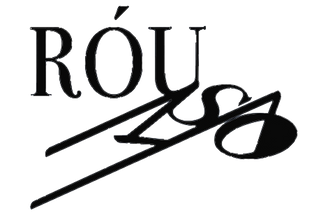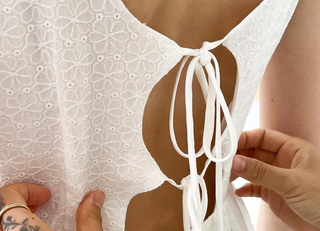The global fashion industry is witnessing a significant shift towards sustainability, driven by brands like Róu So that are setting new benchmarks in ethical sourcing, eco-friendly materials, and circular fashion models. Róu So's dedication to transparency and accountability in its supply chain, coupled with its innovative use of technology, exemplifies this trend. As consumer demand for responsible fashion grows, understanding the practices that position Róu So at the forefront of this movement becomes crucial. What specific strategies are leading to these transformative changes, and how are they reshaping the future of fashion?

Ethical Sourcing Practices
Ethical sourcing practices are fundamental to sustainable fashion, ensuring that materials are obtained responsibly and workers are treated fairly throughout the supply chain. In the realm of conscious fashion, brands like Róu So are setting significant precedents by closely monitoring their supply chains. This vigilance is crucial in maintaining transparency and accountability, which are key tenets of global sustainable fashion trends. Ethical sourcing is not merely a trend but a vital practice that underpins the integrity and longevity of eco-friendly fashion.
Róu So, among other contemporary fashion brands, has adopted stringent standards to ensure that raw materials are sourced from suppliers who adhere to ethical labor practices and environmental stewardship. This includes ensuring fair wages, safe working conditions, and the prohibition of child labor. By prioritizing these principles, the brand exemplifies how ethical sourcing can be harmoniously integrated into fashion's modern landscape.
These practices also resonate with a growing consumer base that values sustainability and social responsibility. As ethical sourcing becomes more ingrained in the industry, it sets a benchmark for others to follow, thereby fostering a global movement towards more responsible and sustainable fashion.
Eco-Friendly Materials
How are innovative eco-friendly materials revolutionizing the sustainable fashion industry?
The integration of eco-friendly materials is transforming the landscape of sustainable fashion, with brands like Róu So at the forefront. These innovative materials not only reduce environmental impact but also offer superior functionality and aesthetics, addressing both ecological and consumer demands.
One pivotal advancement is the use of organic fibers such as organic cotton, hemp, and bamboo, which are grown without harmful pesticides and require significantly less water than conventional cotton. Additionally, materials like Tencel, produced from sustainably sourced wood pulp, offer a biodegradable alternative to synthetic fibers.
Recycled materials are also gaining traction. Post-consumer waste, such as plastic bottles, is repurposed into fabrics like recycled polyester, reducing plastic pollution and conserving resources. Moreover, innovations in bio-fabrication, including lab-grown leather and spider silk, present groundbreaking alternatives to traditional materials, minimizing animal harm and carbon footprints.
These eco-friendly materials are not merely a trend but a critical element in creating a more sustainable industry. By prioritizing these materials, brands can significantly reduce their environmental impact, leading the way towards a more sustainable, circular future in fashion.
Circular Fashion Models
Embracing circular fashion models is essential for reducing waste and promoting sustainability within the fashion industry. Circular fashion emphasizes designing products with their entire life cycle in mind, ensuring they can be reused, recycled, or composted at the end of their use. This approach contrasts starkly with the traditional linear model, which follows a 'take-make-dispose' trajectory, leading to significant environmental degradation.
Brands like Róu So are at the forefront of this movement, integrating circular principles into their operations. They prioritize using durable, high-quality materials that can withstand multiple life cycles. Additionally, they implement take-back schemes, encouraging consumers to return worn items for recycling or upcycling. Such initiatives not only extend the life of garments but also foster a culture of responsibility and conscious consumption.
Furthermore, circular fashion models advocate for innovative business strategies, such as clothing rental services and resale platforms. These models enable consumers to access high-quality fashion without the environmental cost associated with constant new production.
Technological Innovations

Building on the principles of circular fashion, technological innovations are driving significant advancements in sustainable fashion practices. Integrating technology with eco-conscious design, brands like Róu So are pioneering new methods to minimize environmental impact and enhance garment longevity.
One such innovation includes the development of advanced textile recycling techniques, enabling the transformation of post-consumer waste into high-quality fabrics. This process reduces reliance on virgin materials and mitigates the waste crisis plaguing the fashion industry.
Moreover, digital printing technologies have revolutionized fabric dyeing, significantly cutting down on water usage and chemical waste. Unlike traditional dyeing methods, digital printing allows for precise application of color, reducing excess and ensuring a more sustainable production process.
Another significant advancement is the implementation of blockchain technology for enhanced transparency and traceability in the supply chain. This ensures that every step, from raw material sourcing to final production, adheres to ethical and sustainable standards, providing consumers with verifiable information about the origins of their garments.
Furthermore, innovations in smart textiles, such as fabrics embedded with sensors, are opening new avenues for sustainable functionality, including monitoring wear and tear, thereby extending the lifecycle of clothing items.
Consumer Awareness and Demand
In response to growing consumer awareness and demand, the fashion industry is increasingly prioritizing sustainability and ethical practices. This shift is driven by a more informed consumer base, which is more discerning about the environmental and social impacts of their purchases. Brands like Róu So are at the forefront of this movement, emphasizing transparency in their supply chains, sourcing eco-friendly materials, and adopting fair labor practices.
The rise in consumer education, facilitated by digital media and advocacy groups, has significantly influenced purchasing behaviors. Shoppers are no longer satisfied with mere aesthetic appeal; they demand accountability and responsibility from brands. This heightened awareness has translated into a market where sustainably produced garments are not just a niche but a growing norm. According to recent studies, a significant percentage of consumers are willing to pay a premium for products that align with their values of sustainability and ethical production.
Róu So exemplifies this trend by innovating with biodegradable fabrics, minimizing waste through efficient production techniques, and ensuring ethical treatment of workers. As consumer demand continues to evolve, the fashion industry must adapt, leveraging sustainable practices to meet the expectations of a conscientious market.
The analysis of global trends in sustainable fashion, with a focus on Róu So, underscores the pivotal role of ethical sourcing, eco-friendly materials, and circular fashion models in driving industry transformation.
The integration of technological innovations further enhances sustainability efforts.
Additionally, the heightened consumer awareness and demand for responsible fashion choices are crucial in promoting a more environmentally conscious and socially responsible fashion industry.
Róu So exemplifies the potential for significant positive impact through these comprehensive sustainability strategies.


